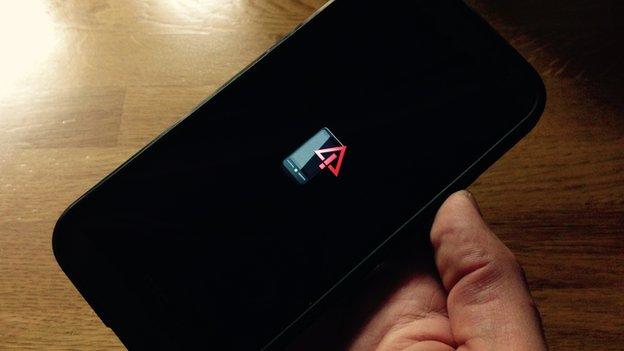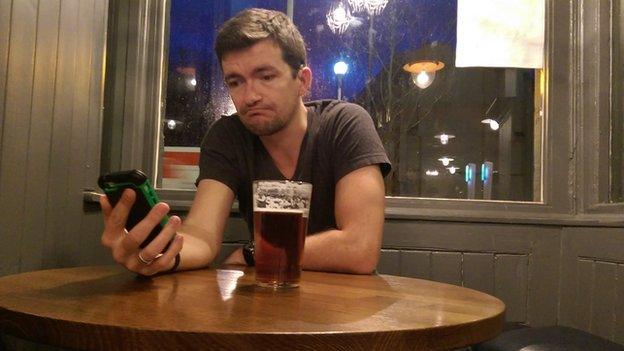Smartphones make deaf life easier but at the expense of what?
- Published

Smartphones have created a more accessible world for deaf people but are they killing off their much-loved deaf social clubs?
Last Christmas, I destroyed my phone. I connected it to my laptop and executed a command which wiped its entire memory and operating system, leaving nothing but a flashing exclamation mark on its screen.
As a deaf person, the only thing I don't use my phone for is making calls - everything else about it gives me incredible access to the world around me.
In the past, when travelling by train, I would miss announcements of a last minute change of platform or delay. Now I can use an app which not only tells me the train time and platform it's departing from but does so before it appears on the station monitors. Now I'm first on the train and in a seat before the stampede starts.
Instead of having to ask a stranger to call me a taxi after the last bus has gone, I can order one for myself with a few swipes of the screen.
Video chat apps let me talk to family and friends face to face so I can lip-read them or sign with them. On mobile, Facebook allows me to do this now too.
And when I first joined Twitter in 2009, it felt like being in a huge pub conversation which I could follow easily, and participate in on an equal footing without misunderstandings to make me look stupid. By contrast, a real life pub is a place where conversations are hard to hold, with lots of music, background noise and not enough light to lip-read.
My phone has become increasingly important with a proliferation of clever new services available, and lately... perhaps a little too important.
Rather than try to arrange to meet a friend for a chat, I've noticed I'm now more likely to have a brief online interaction with them. And instead of sharing my innermost feelings face-to-face with someone who matters, I'll post them up on an anonymous messageboard and crowdsource opinion - an annoying keyboard hero who wouldn't have those kinds of conversations offline.
I'm becoming too reliant on my phone, at the expense of everything else.

Being phoneless for two weeks over Christmas led to me making more eye contact with people, having longer conversations without nagging vibrations in my pocket, and I found I could hold onto a thought for longer than a few seconds. I felt a better person - and it made me think about the downside for deaf people who were unusually sociable animals before this apparent golden age of access.
Before technology made things easier, sign language users would drop in to deaf clubs so they could have conversations with those who spoke the same language as them. Always there, they are sociable, family-oriented places, a bit like a pub with extra benefits. These days, people are vexed because they are closing down rapidly They're not surviving because it's now easy to organise their own smaller get-togethers. Without text or video chat, in the past you would have to send a letter to arrange a meet-up with a deaf friend and just hope they turned up at the right place on the date and time you suggest. It sounds ridiculously basic but nowadays technology allows deaf people to organise get-togethers easily - and it doesn't have to be in a special club any more.
I'm also starting to wonder whether Twitter and Facebook are holding the deaf community back and, in reality, not giving them the voice they think they now have. Deaf people have to engage in a lot of political lobbying, but is liking a Facebook campaign or signing an online petition as effective as we hope?
Also, deaf people post BSL videos on Facebook and can make their points very effectively in their first language. These videos are shared with other sign language users, but are their thoughts understood by the wider online community? There are few BSL users around and so without a transcript in written English - probably not.
Technology is changing everyone's lives - faster than anyone really understands. It's probably too late to go back to the old ways of a central deaf club where everyone could meet to exchange stories, and find out the latest news. Maybe deaf clubs of the future exist mostly online, and everyone will get their news from status updates and newsfeeds.
As for me? I'm walking to work every day now, instead of staring at my phone on public transport. At lunchtimes I leave my phone on my desk and try to talk to other people face to face. I feel better as a result. But I'm still a slave to my phone - and it's time I did something about it.
William Mager is the series producer for See Hear, the long-running programme for the deaf community. Watch it on BBC Two Wednesday mornings at 10:30.
Follow @BBCOuch, external on Twitter and on Facebook, external, and listen to our monthly talk show